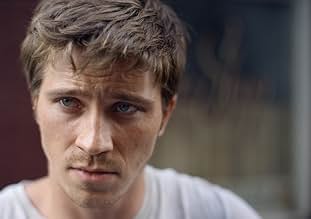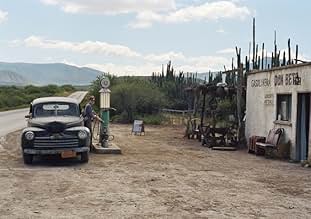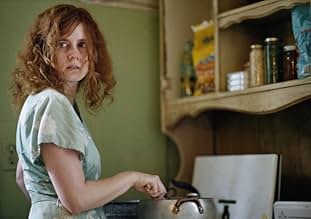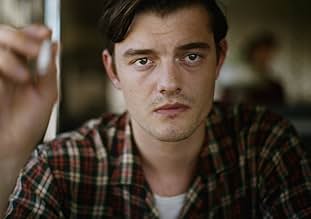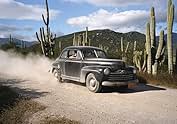Le jeune écrivain Sal Paradise voit sa vie chamboulée par l'arrivée de Dean Moriarty et de sa fille, Marylou. Lorsqu'ils parcourent le pays, ils côtoient de diverses personnes qui ont chacun... Tout lireLe jeune écrivain Sal Paradise voit sa vie chamboulée par l'arrivée de Dean Moriarty et de sa fille, Marylou. Lorsqu'ils parcourent le pays, ils côtoient de diverses personnes qui ont chacune un impact inébranlable sur leur voyage.Le jeune écrivain Sal Paradise voit sa vie chamboulée par l'arrivée de Dean Moriarty et de sa fille, Marylou. Lorsqu'ils parcourent le pays, ils côtoient de diverses personnes qui ont chacune un impact inébranlable sur leur voyage.
- Réalisation
- Scénario
- Casting principal
- Récompenses
- 2 victoires et 4 nominations au total
- Walter's Wife
- (as Tetchena Bellange)
Avis à la une
Making a film on such a book requires selection. Kerouac's hedonistic rampage across America, as selected by director Walter Salles, looks more mindless and sex-spiced than it did in the novel. Kerouac, as we see in his later works, was a hedonist with a conscience; a deadly combination which likely led to him drinking himself to death. Director Salles sees what he wants to see, a sex-crazed, drug-crazed, two-dimensional man. If this was truly the man represented in the novel, the novel would not have had the enduring quality that has made it literature.
I liked the way the 1950s was captured in the film. It was as close to perfection as you could get. The importance of jazz with its improvisation mirrors the lives of the travelers. The acting is good but the interaction is not. Maybe that was the point. There is no need for interaction in an age when the highest morality was based on selfishness. The movie may be okay to watch once, but I would prefer not to go down this road again.
This is best illustrated by the presentation of the character of Dean Moriarty. He should be the driving force of the story, pushing the storyline on with his crazed excitement for the good and bad in life. On the printed page he can barely speak fast enough to get all his thoughts out. However in the film he huffs and puffs his way from one scene to the next, speaking in a laconic drawl, whilst lacking all the charm and charisma that is supposed to make him so alluring. He is the muse for the writer character of Sal, but anyone coming to the film fresh without having read the book, may well struggle to understand why.
The film lacks a rounded sense of the hedonistic side of the journey. The sex is arguably overplayed and whilst there is some drugs and jazz, there is little of the booze. Crucially the characters rarely seem to be having a good time. The film seems to focus on the melodramatic, miserable aspects of the characters lives at the destinations they travel to, but fails to contrast this with wild and exciting times spent on the road. The film does not convey a sense of travelling for the journeys sake; they always just seem to be in the car in order to get to another destination. The only time the film gets anywhere near the free spirited adventure of the book is when the characters reach Mexico in the later stages of the film, but this is too little too late.
I did wonder whether the muted atmosphere of the film was a deliberate ploy of the filmmakers, however the last ten minutes would indicate not. Here we see the character of Sal typing up the notes he has made during the road trips, seemingly franticly typing to capture all the wild, fun, crazy times had on the road. However this does not reflect what the viewer has just witnessed on screen for the past two hours.
Taken on its own terms the film does offer fine cinematography, costume and the look of the time, as well as some decent acting (hence my score of 5 out of 10). However as an adaption of a seminal piece of literature, it deserves to be judged against the source material and in not capturing the true spirit of the book, it is a big fail.
So, everyone already knows the story well, no; chances are, if you're like me, you read the book and yet remember almost nothing of the story. The book burns through its shreds of storyline as if they were just tinder for the blaze of its energy; the real fuel is the pacing, even with all its redundancy. It's the momentum that sucks us into the breathless chaos of Kerouac's world. We come away impressed by the energy, not the content.
Film could certainly have been used to amplify this effect, but this is not that film. Instead, we have a more conventional treatment, focusing on character development. It's a nice production, with an attractive cast. But the story comes at us very differently from the book experience. The manuscript has been rewritten to add breathing space and objectivity. We see Sal Paradise, only half-formed at the start of the story, pull himself together to become a serious writer. We see the endlessly exuberant Dean Moriarity ultimately coming to grips with the progressive self- destruction attributable to his amorality, and suffering. This might be a fair reading of Kerouac's ultimate feelings about that part of his life, but it's not the feeling that Kerouac shares with us in the book. We have lost our innocence; our last chance to revisit it, even for a few hours, is taken away.
I'm not going to rage against this re-conception of the story, though, because it makes other changes from the book that might be improvements. Several episodes that were censored from the book are restored in the film. (Some discussion of this at http://www.univie.ac.at/Anglistik/easyrider/data/BeatEros.htm). So the movie is more historically accurate, and far more sexually explicit than the book. (That could also explain its delayed US release). In one poignant scene, Carlos Marx (Allen Ginsberg) is whining to Sal about how vulnerable he feels due to his poorly-returned love for Dean. To the best of my recollection, that conversation was not in the book (please tell me if you believe otherwise), but was expressed in a private letter from Ginsberg to Kerouac many years after the fact. This kind of thing changes the emotional flow of the story, certainly, but it adds depth, too.
Few of us will actually suffer nostalgia for the gritty overindulgences of the Beats. But remember, this came at a time when society was absolutely saturated with the message that everyone should be "normal," safe, predictable. Without the tiny minority of Beats attacking that message, and specifically without On The Road to chronicle that attack, the cultural revolution of the 1960's would have been even more difficult than it was, and perhaps less effective. Good, bad, or ugly, we must embrace this story.
Le saviez-vous
- AnecdotesThere have been many previous attempts to get the film made since the 1950s. Author Jack Kerouac sought to have himself play Sal Paradise opposite Marlon Brando as Dean Moriarty. In 1990, Francis Ford Coppola was set to direct with Ethan Hawke as Sal, Winona Ryder as Marylou and Brad Pitt as Dean. Later, Joel Schumacher was attached to direct with Billy Crudup as Sal and Colin Farrell as Dean. Gus Van Sant was later involved as a potential director.
- GaffesIn the opening scenes, Sal Paradise hitches a ride on the old farm truck. The large, round hay and straw bales in the background weren't available until 1972, when Vermeer built and sold the model 605 baler. Even then, the bales were much smaller and looser until the late '70s or early '80s on United States farms.
- Citations
Sal Paradise: The only people for me are the mad ones, the ones who are mad to live, mad to talk, mad to be saved, desirous of everything at the same time, the ones who never yawn or say a commonplace thing, but burn, burn, burn like fabulous yellow roman candles exploding like spiders across the stars.
- Versions alternativesThe film was re-edited for North American release following its premiere at the Cannes Film Festival and its French theatrical release because, according to director Walter Salles, that version was "rushed". The new cut is thirteen minutes shorter but contains more scenes and Salles says he has no preference between the two.
- ConnexionsFeatured in At the Movies: Cannes Film Festival 2012 (2012)
- Bandes originalesThat's It
Composed and produced by Gustavo Santaolalla
Meilleurs choix
- How long is On the Road?Alimenté par Alexa
Détails
- Date de sortie
- Pays d’origine
- Sites officiels
- Langues
- Aussi connu sous le nom de
- En el camino
- Lieux de tournage
- Bariloche, Río Negro, Argentine(uncredited)
- Sociétés de production
- Voir plus de crédits d'entreprise sur IMDbPro
Box-office
- Budget
- 25 000 000 $US (estimé)
- Montant brut aux États-Unis et au Canada
- 744 296 $US
- Week-end de sortie aux États-Unis et au Canada
- 39 550 $US
- 23 déc. 2012
- Montant brut mondial
- 9 617 377 $US
- Durée2 heures 4 minutes
- Couleur
- Mixage
- Rapport de forme
- 2.35 : 1
Contribuer à cette page









